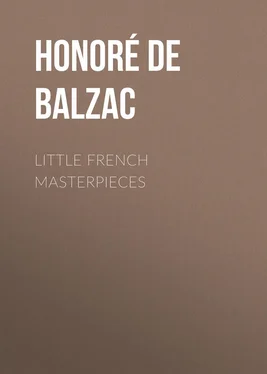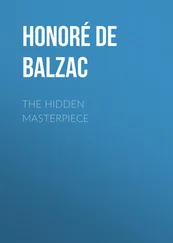Honoré Balzac - Little French Masterpieces
Здесь есть возможность читать онлайн «Honoré Balzac - Little French Masterpieces» — ознакомительный отрывок электронной книги совершенно бесплатно, а после прочтения отрывка купить полную версию. В некоторых случаях можно слушать аудио, скачать через торрент в формате fb2 и присутствует краткое содержание. Жанр: foreign_antique, foreign_prose, на английском языке. Описание произведения, (предисловие) а так же отзывы посетителей доступны на портале библиотеки ЛибКат.
- Название:Little French Masterpieces
- Автор:
- Жанр:
- Год:неизвестен
- ISBN:нет данных
- Рейтинг книги:5 / 5. Голосов: 1
-
Избранное:Добавить в избранное
- Отзывы:
-
Ваша оценка:
- 100
- 1
- 2
- 3
- 4
- 5
Little French Masterpieces: краткое содержание, описание и аннотация
Предлагаем к чтению аннотацию, описание, краткое содержание или предисловие (зависит от того, что написал сам автор книги «Little French Masterpieces»). Если вы не нашли необходимую информацию о книге — напишите в комментариях, мы постараемся отыскать её.
Little French Masterpieces — читать онлайн ознакомительный отрывок
Ниже представлен текст книги, разбитый по страницам. Система сохранения места последней прочитанной страницы, позволяет с удобством читать онлайн бесплатно книгу «Little French Masterpieces», без необходимости каждый раз заново искать на чём Вы остановились. Поставьте закладку, и сможете в любой момент перейти на страницу, на которой закончили чтение.
Интервал:
Закладка:
"What's the matter?" she asked.
"The matter – the matter – " he cried, choking with joy; "the matter is that I have come to feel that I am a painter. I have always doubted myself before, but this morning I believe in myself! I tell you, Gillette, we shall be rich, happy! There is gold in these brushes."
But suddenly he ceased to speak. His strong and serious face lost its joyous expression when he compared the vastness of his hopes with the paucity of his resources. The walls were covered with pieces of common paper on which were sketches in pencil. He owned no clean canvases. Paints commanded a high price in those days, and the poor young man's palette was almost bare. In the depths of his poverty he possessed and was conscious of an incredible store of courage and a superabundance of all-consuming genius. Brought to Paris by a gentleman who was a friend of his, or perhaps by his own talent, he had almost immediately fallen in with a mistress, one of those noble and devoted souls who suffer beside a great man, espouse his troubles, and try to understand his caprices; strong in poverty and love, as other women are fearless in bearing the burden of luxury and in parading their lack of feeling. The smile that played about Gillette's lips diffused a golden light through that garret, and overspread the sky with brightness. The sun did not always shine, whereas she was always there, sedate in her passion, clinging to her happiness and her suffering, encouraging the genius which overflowed in love before seizing upon art.
"Listen, Gillette – come here."
The light-hearted, obedient girl jumped upon the painter's knees. She was all grace, all beauty, lovely as a spring day, adorned by all womanly charms, and illumining them with the glow of a lovely soul.
"O God!" he cried, "I shall never dare to tell her."
"A secret?" said she; "I insist upon knowing it."
Poussin seemed lost in thought.
"Speak, I say."
"Gillette – poor, beloved darling!"
"Ah! you want something of me, do you?"
"Yes."
"If you want me to pose for you as I did the other day," she said, with a little pout, "I shall never consent; for at those times your eyes have nothing at all to say to me. You forget all about me, and yet you look at me."
"Would you prefer to see me painting another woman?"
"Perhaps so," she said, "if she was very ugly."
"Well," rejoined Poussin, in a serious tone, "suppose that, for any future glory, to make me a great painter, it were necessary for you to pose for another artist?"
"You can test me all you choose," she replied. "You know that I would not go."
Poussin let his head fall on his breast, like one who surrenders to a joy or a sorrow that is too great for his heart.
"Listen," said she, plucking at the sleeve of Poussin's threadbare doublet, "I have told you, Nick, that I would give my life for you; but I never promised to give up my love while I am alive."
"Give it up?" cried the young artist.
"If I should show myself like that to another man, you would cease to love me, and I should deem myself unworthy of you. Is it not a most simple and natural thing to obey your whims? In spite of myself, I am happy, aye, proud, to do your dear will. But for another man – ah, no!"
"Forgive me, my Gillette," cried the painter, throwing himself at her feet. "I prefer to be beloved rather than famous. In my eyes you are fairer than wealth and honours. Go, throw away my brushes, burn these sketches. I have made a mistake. My vocation is to love you. I am no painter, I am a lover. Away with art and all its secrets!"
She gazed admiringly at him, happy, overjoyed. She was queen; she felt instinctively that art was forgotten for her, and cast at her feet like a grain of incense.
"And yet it is only an old man," continued Poussin. "He could see only the woman in you – you are so perfect!"
"One must needs love," she cried, ready to sacrifice the scruples of her love to repay her lover for all the sacrifices that he made for her. "But," she added, "it would be my ruin. Ah! ruin for you – yes, that would be very lovely! But you will forget me! Oh! what a wicked idea this is of yours!"
"I conceived the idea, and I love you," he said with a sort of contrition; "but am I for that reason a villain?"
"Let us consult Father Hardouin," she said.
"Oh, no! let it be a secret between us."
"Very good, I will go. But do not be there," she cried. "Stay at the door, with your dagger drawn; if I cry out, come in and kill the painter."
With no eyes for aught but his art, Poussin threw his arms about Gillette.
"He no longer loves me!" thought Gillette, when she was alone.
Already she repented her decision. But she was soon seized by a terror more painful than her regret; she strove to drive away a shocking thought that stole into her mind. She fancied that she already loved the painter less, because she suspected that he was less estimable than she had hitherto believed.
II
CATHERINE LESCAULT
Three months after the meeting of Poussin and Porbus, the latter went to see Master Frenhofer. The old man was then in the depths of one of those periods of profound and sudden discouragement, the cause of which, if we are to believe the mathematicians of medicine, consists in bad digestion, the wind, the heat, or some disturbance in the hypochondriac region; and, according to the spiritualists, in the imperfection of our moral nature. The good man had simply tired himself out in finishing his mysterious picture. He was languidly reclining in an enormous chair of carved oak, upholstered in black leather; and without changing his depressed attitude, he darted at Porbus the glance of a man who had determined to make the best of his ennui.
"Well, master," said Porbus, "was the ultramarine, that you went to Bruges for, very bad? Haven't you been able to grind our new white? Is your oil poor, or are your brushes unmanageable?"
"Alas!" cried the old man, "I thought for a moment that my work was finished; but I certainly have gone astray in some details, and my mind will not be at rest until I have solved my doubts. I have almost decided to travel, to go to Turkey, to Greece, and to Asia, in search of a model, and to compare my picture with nature in different climes. It may be that I have up-stairs," he continued with a smile of satisfaction, "Nature herself. Sometimes I am almost afraid that a breath will awaken that woman and that she will disappear."
Then he rose abruptly, as if to go.
"Ah!" replied Porbus; "I have come just in time to save you the expense and the fatigue of the journey."
"How so?" asked Frenhofer in amazement.
"Young Poussin is loved by a woman whose incomparable beauty is absolutely without a flaw. But, my dear master, if he consents to lend her to you, you must at least let us see your picture."
The old man stood, perfectly motionless, in a state of utter stupefaction.
"What!" he cried at last, in a heartrending voice, "show my creation, my spouse? Tear away the veil with which I have modestly covered my happiness? Why, that would be the most shocking prostitution! For ten years I have lived with that woman; she is mine, mine alone, she loves me. Does she not smile at every stroke of the brush which I give her? She has a soul, the soul with which I have endowed her. She would blush if other eyes than mine should rest upon her. Show her! Where is the husband, the lover, base enough to lend his wife to dishonour? When you paint a picture for the court, you do not put your whole soul into it, you sell to the courtiers nothing more than coloured mannikins. My painting is not a painting; it is a sentiment, a passion! Born in my studio, it must remain there unsullied, and can not come forth until it is clothed. Poesy and women never abandon themselves naked to any but their lovers! Do we possess Raphael's model, Ariosto's Angelica, or Dante's Beatrice? No! We see only their shapes. Very well; the work which I have up-stairs under lock and key is an exception in our art. It is not a canvas, it is a woman; a woman with whom I weep, and laugh, and talk, and think. Do you expect me suddenly to lay aside a joy that has lasted ten years, as one lays aside a cloak? Do you expect me suddenly to cease to be father, lover, and God? That woman is not a creature, she is a creation. Let your young man come – I will give him my wealth; I will give him pictures by Correggio, Michelangelo, or Titian; I will kiss his footprints in the dust; but make him my rival? Shame! Ah! I am even more lover than painter. Yes, I shall have the strength to burn my Belle Noiseuse when I breathe my last; but to force her to endure the glance of a man, of a young man, of a painter? No, no! I would kill to-morrow the man who should sully her with a look! I would kill you on the instant, my friend, if you did not salute her on your knees! Do you expect me now to subject my idol to the insensible glances and absurd criticisms of fools? Ah! love is a mystery, it lives only in the deepest recesses of the heart, and all is lost when a man says, even to his friend: 'This is she whom I love!'"
Читать дальшеИнтервал:
Закладка:
Похожие книги на «Little French Masterpieces»
Представляем Вашему вниманию похожие книги на «Little French Masterpieces» списком для выбора. Мы отобрали схожую по названию и смыслу литературу в надежде предоставить читателям больше вариантов отыскать новые, интересные, ещё непрочитанные произведения.
Обсуждение, отзывы о книге «Little French Masterpieces» и просто собственные мнения читателей. Оставьте ваши комментарии, напишите, что Вы думаете о произведении, его смысле или главных героях. Укажите что конкретно понравилось, а что нет, и почему Вы так считаете.












